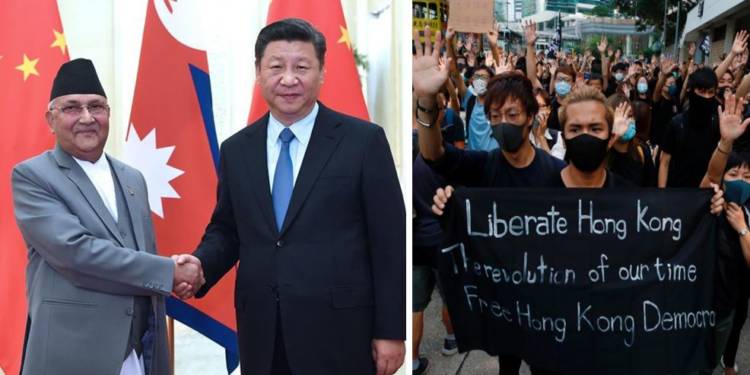The Chinese government desperately needs diplomatic support as the world battles a China made pandemic. One would have thought that the coronavirus pandemic would have finally made the Chinese Communist Party behave but on the contrary, it has moved to curtail Hong Kong’s autonomy under the “One Country, two systems rule” by bringing the controversial National Security legislation. With only Pakistan by its side, China desperately needed better allies who could spread Chinese propaganda. Nepal, under the communist government, is happy to help.
It seems that the CCP’s search has ended as thanks to the ideological affinity, the Nepal government has taken a sudden tilt towards China. At a time when there is international pressure on China over its move to curtail Hong Kong’s economy, the Himalayan nation has stood up and backed Xi Jinping’s actions as it has claimed that Hong Kong is an “integral” part of China.
In what portrays how deep is the CCP’s influence in the Nepal government, the KP Sharma Oli government has come out in support of the “One China policy” and stated that Hong Kong is an “integral” part of China.
The country’s Ministry of Foreign Affairs in a statement said, “ Nepal reiterates its ‘One China policy’ and considers Hong Kong as an integral part of the People’s Republic of China. Maintenance of peace, law and order is a primary responsibility of a nation. Nepal believes in non-interference in the internal affairs of any country and supports China’s efforts to maintain law and order in Hong Kong.”
Now, if Nepal really believes in “non-interference in the internal affairs of any country,” they could have refrained from making a statement and let China deal with the concerns of the US and UK over its decision. However, the fact that Nepal made a statement that completely backs the CCP, reveals that the CCP has ordered Nepal to make such a statement.
China except for Pakistan hasn’t found any solid support over the introduction of national security bill in Hong Kong. China is fully aware that no one pays heeds to Imran Khan’s wailing and a person who travels everywhere with a begging bowl certainly cannot be trusted beyond a point. Nepal is just another blue-eyed country for the Chinese government who will likely replace Pakistan in doing the CCP’s bidding and act as lapdog-in-chief.
Under Hong Kong’s Basic Law, which is in place since 1997, it largely has responsibility for its own internal security. However, China wants to change this and cease control of the internal security affairs of the city. This is directly aimed at the pro-democracy protests which the CCP has been trying to equate with “terrorism”.
Through the national security legislation, Beijing plans to stop mass protests by banning acts of treason, secession and subversion which would effectively signal the end of the “one country, two systems” principle which China had promised to the UK when it took over the reins of Hong Kong in 1997 and pledged to keep the city semi-autonomous until 2047. Previous attempts to introduce the legislation in 2003 was met with protests and was subsequently withdrawn.
US Secretary of State Mike Pompeo said that the new national security legislation will effectively act as a “death knell” for the autonomy of the city. The US has also threatened to slap China with sanctions over this.
The diplomatic pressure on China increased after UK Prime Minister Boris Johnson pledged to admit 3 million people from Hong Kong into the UK after the Chinese parliament passed the national security legislation.
Johnson in a column wrote, “Many people in Hong Kong fear that their way of life — which China pledged to uphold — is under threat. If China proceeds to justify their fears, then Britain could not in good conscience shrug our shoulders and walk away; instead, we will honour our obligations and provide an alternative.”
The timing of Nepal government’s statement is also significant as it came just a day after the US, the UK, Australia, and Canada, in a joint statement criticised China as they stated that the passing of the national security law, was in direct conflict with its international obligations under the principles of the legally – binding, Sino-British Joint Declaration. It is important to note that the declaration is United Nations registered.
Under severe international pressure, China has now deployed Nepal to do its bidding. While the ruling communists will certainly gain monetarily as the Himalayan nation will now see an influx of Chinese money, it will be disastrous for Nepal as it will gain nothing by replacing Pakistan as it also risks getting diplomatically isolated by blindly supporting China at a time when the international community is determined to punish China for its sins.























